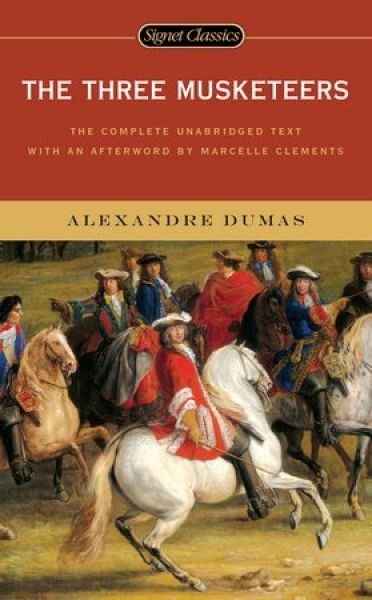Stand By Me
The Three Musketeers (D’Artagnan Romances, volume 1)
By Alexandre Dumas

5 Feb, 2017
Because My Tears Are Delicious To You
0 comments
Alexandre Dumas’ 1844 The Three Musketeers, originally published in French as Les Trois Mousquetaires, is the first of three D’Artagnan Romances.
The young Gascon aristocrat D’Artagnan sets out to find his fortune, armed with an elderly horse, his sword, a small sum of money, a letter of introduction to the Musketeers and some comprehensively bad advice from his father.
Confrontational pride and a failure to foresee that his enemies might cheat costs D’Artagnan sword and his letter of introduction before he reaches Paris. No matter: not only does the encounter grant him a bitter enemy, something no habitual duelist should be without, but M. de Tréville, Captain of the Musketeers, deigns to meet with the young man despite his lack of accreditation. Alas, under the current circumstances there is no place for D’Artagnan in the Musketeers.
D’Artagnan befriends three Musketeers (Athos, Aramis and Porthos) in the usual way, by offending each in turn and agreeing to a duel. The young Gascon is spared certain death because it is very early in a very long novel and because Cardinal Richelieu’s guards have the effrontery to try to arrest the duelist on the specious grounds that dueling is illegal. A common enemy is sufficient for the three Musketeers to accept the Gascon as one of their own.
Just in time, because Richelieu has a grand plan to destroy Queen Anne. With Anne gone, naive young King Louis XIII will have Richelieu and only Richelieu to turn to for advice and guidance. Anne has been very foolish indeed and what’s worse, Richelieu can prove it. Or at least he will be able to, if D’Artagnan and his friends do not intervene.
~oOo~
I am cheating a bit because this is not the extremely streamlined version of The Three Musketeers that I read as a teen. Like Jules Verne, Dumas’ English translations have tended to be slapdash and censored to please Anglophone sensibilities. I don’t know if the 1991 Hochman translation is one of the better translations. It was, however, available at my library1.
Modern readers should expect some values dissonance. What was considered acceptable and good in the 17th century is very different from what we would consider acceptable and good. Athos thinks of himself as a good fellow because he did not satisfy his infatuation with an attractive woman by raping her but rather married her. He also thinks he was completely justified in later off-handedly murdering her for not having mentioned a certain detail of her past. One wonders what the story looked like from his wife’s point of view.
D’Artagnan father’s advice is as follows:
Endure no slight from anyone except Monsieur the Cardinal and the king. Understand that it is by his courage and by his courage alone that a gentleman can make his way nowadays. Whoever hesitates for a second may lose the chance offered to him by fortune in that very second. You are young, and you should be brave for two reasons: the first is that you are a Gascon, and the second is that you are my son. Never fear quarrels, and seek out adventures. I have taught you how to handle a sword; you have legs of iron, and a wrist of steel. Fight duels on all occasions, the more-so because for duels are forbidden, and consequently there is twice as much courage to fight them.
This is terrible advice to give a son if one would like grandchildren but excellent advice if you would like your son to have adventures before an untimely death at very young age. I was in no way surprised later in the novel when the characters firmly assert “The Gascons are the Scots of France,” because the Gascon D’Artagnan shows the same resoluteness, the same wisdom and foresight that made the Battle of Flodden such a glorious victory.
By temperament I (and presumably, all good people) favour D’Artagnan and his friends. Who hasn’t wanted to return a slight by running steel through the offender? It’s only human to respond to minor affronts with homicidal rage. I admit there’s something to the idea that, as despicable as his allies and tactics are, Richelieu is better for France, particularly in the context of a Europe caught up in the Thirty Years War. The Cardinal’s enemies are bold and brave but also imprudent and foolish. It is not that D’Artagnan and company are stupid, merely that they do not allow their intelligence to inhibit them. Ideal protagonists but not ideal statesmen.
Until now, I never noticed that The Three Musketeers is very funny. In fact, the impression I had of it was that it was rather gloomy. I was going to say that this was because the Lester adaptation was gloomy but I see that in fact it had comedic elements. The explanation is, as previously established, that I have a sense of humour present only in homeopathic quantities.
This was an amusing surprise. I have never read the other books in the sequence but I probably will. And maybe with the next volume, I will give myself enough lead time to find the best possible translation.
The Three Musketeers is available here (Amazon) and here (Kobo).
Please direct corrections to jdnicoll at panix dot com
1: Why didn’t I buy one of the translations recommended to me from Kobo? Because Kobo’s search engine is terrible and I got frustrated enough to stop looking before I found an appropriate edition.
